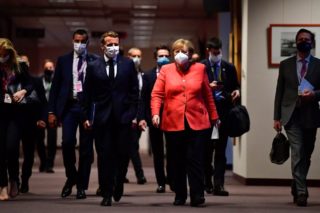European Union leaders early on Tuesday stepped up to confront one of the gravest challenges in the bloc’s history, agreeing to a landmark spending package to rescue their economies from the ravages of the pandemic.
The 750 billion euro ($857 billion) stimulus agreement, spearheaded by Chancellor Angela Merkel of Germany and President Emmanuel Macron of France, sent a strong signal of solidarity even as it exposed deep new fault lines in a bloc reshaped by Britain’s exit.
The deal was notable for its firsts: Countries will raise large sums by selling bonds collectively, rather than individually; and much of that money will be handed out to member nations hit hardest by the pandemic as grants, not loans.
“Europe has shown it is able to break new ground in a special situation. Exceptional situations require exceptional measures,” Ms. Merkel said in a news conference at dawn. “A very special construct of 27 countries of different backgrounds is actually able to act together, and it has proven it.”
The talks were defined by shifting roles among members now jostling to make their voices heard and for leadership in the absence of Britain, which had often played the part of the thrifty contrarian, fastidious about rules, in past summits.
This time, Ms. Merkel, who holds the E.U.’s rotating presidency, put her finger on the scale on behalf of hard-hit southern countries and did battle with the nations she once championed, the northern members that have been less affected by the virus and are wary of the vast sums being thrown around.
Economists predict a recession in Europe far worse than anything since World War II. France, Italy and Spain, the bloc’s second-, third- and fourth-largest economies, are expected to suffer the most, clocking in contractions of around 10 percent this year.
Greece and other smaller economies that are still recovering from the last recession will also be badly affected by the downturn.
The package now goes to the European Parliament for ratification, where it is expected to face a serious challenge on the grounds that it does not tackle concerns about how Poland and Hungary’s governments violate the bloc’s standards for democracy and the rule of law.
FEATURED IMAGE: President Emmanuel Macron of France and Chancellor Angela Merkel of Germany after European leaders reached a deal in Brussels on Tuesday. Pool photo by John Thys
The New York Times





